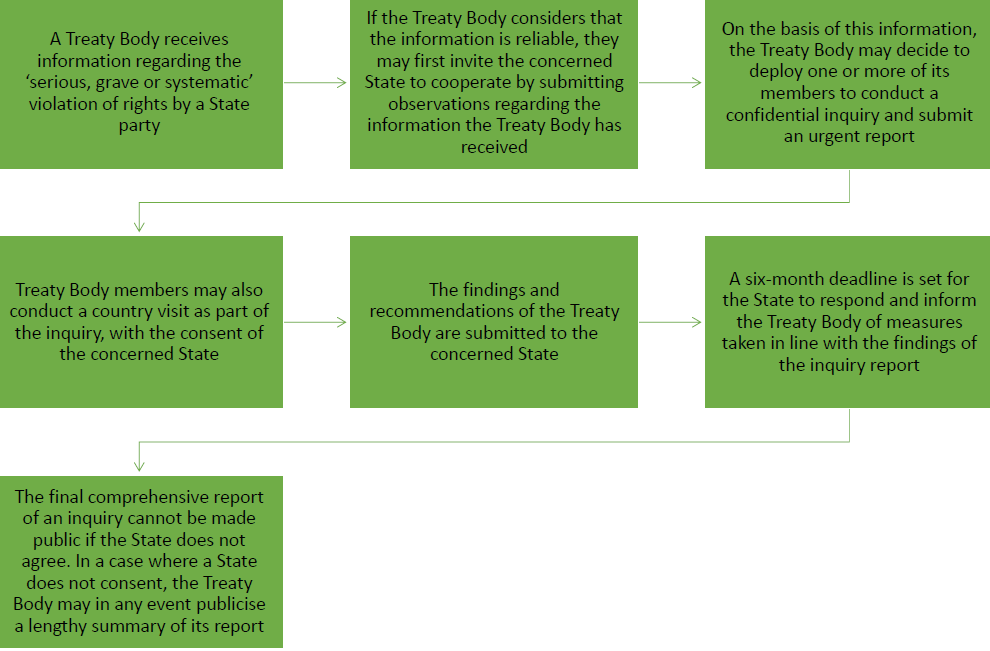This section provides information on how you can request a Treaty Body to initiate an inquiry.
It follows from the last section on Inquiries – Why are they useful?
The inquiry procedure can be a useful tool of the Treaty Bodies if used strategically by a human rights defender.
You can engage in Treaty Body inquiries in the following ways:
Who can submit information?
Anyone can submit information to a Treaty Body for consideration to commence an inquiry.
There is no requirement that organisations have ECOSOC status (or be registered with the UN).
Individuals also can submit information to a Treaty Body.
Criteria for admissibility
As mentioned, not all Treaty Bodies are able to conduct inquiries across all States. There are two pre-conditions:
Example:
Article 20 of the Convention against Torture mandates the Committee against Torture to conduct confidential inquiries. Of the 175 States who have ratified the Convention against Torture, those that do not recognise the competence of the CAT provided for under article 20 (that is they have opted out of article 20 and do not consent to CAT inquiries) are: Bahamas, China, Dominica, Equatorial Guinea, Eritrea, Israel, Lao People’s Democratic Republic, Mauritania, Oman, Pakistan, Poland, Samoa, Saudi Arabia, Syrian Arab Republic, the United Arab Emirates and Viet Nam. Some countries don’t state that they don’t recognise it, but rather make reservations (for instance, related to national sovereignty).

Six treaty bodies have the mandate to initiate inquiries - this means that the treaty or optional protocol to the treaty includes a provision which specifically provides for an inquiry by the relevant Treaty Body. These are: CESCR (article 11 of the optional protocol to the ICESCR), CEDAW (articles 8 and 10 of the Optional Protocol), CAT (article 20), CRC (article 13 of the optional protocol to the CRC), CRPD (article 6 of the optional protocol to the CRPD), and CED (article 33)
You can find out if your State has ratified a particular Treaty through the UN Treaty Body Database. Find your country and see the ratification status for your State, as well as status of acceptance of inquiry and individual complaints procedures.
What information should you include?
Details on what information you should provide to individual Treaty Bodies is available on the web pages of the particular Treaty Body (on the page related to inquiries), where available. See below for links to the relevant webpages.
Submissions can be made in any one of the UN languages: Arabic, Chinese, English French, Russian, Spanish, with a summary in English if possible if the submission is not in English (this to accommodate the majority of Treaty Body members who may not be conversant with the language of the submission).

To request an inquiry:
The information you submit must be reliable and it must demonstrate that there are ‘serious, grave or systematic’ violations of treaty provisions within the State.
You may also be required to demonstrate that such violations are not occurring in a single or isolated region in a State party but that they are widespread – occurring ‘throughout the territory of the State’.
The information should be evidence based.
There is no form, and very limited guidance on what to include in your submission, but it’s a good idea to follow general formats for other requests and submissions to UN human rights mechanisms like the individual communications or the Special Procedures.
To make submissions in regard to existing inquiries:
Remember!
For detailed information on the inquiry process and specific working methodologies of individual Treaty Bodies:
Where should information be sent?
Written submissions should be sent to the Secretariat of the relevant Treaty Body (within the OHCHR)
What can you expect after you make your submission?
Very little! Even if you are the initiator of the inquiry process, unless you have insider informants you will not receive much information. The inquiry procedure is confidential, and thus Treaty Bodies share very limited, if any, information during the inquiry process.

To view the steps of a Treaty Body Inquiry Procedure, click here
To find out what you can do with a Treaty Body inquiry report, see ISHR Academy: Following up with Treaty Bodies.
See the next sections on how you can engage in Treaty Body early warnings and urgent actions.